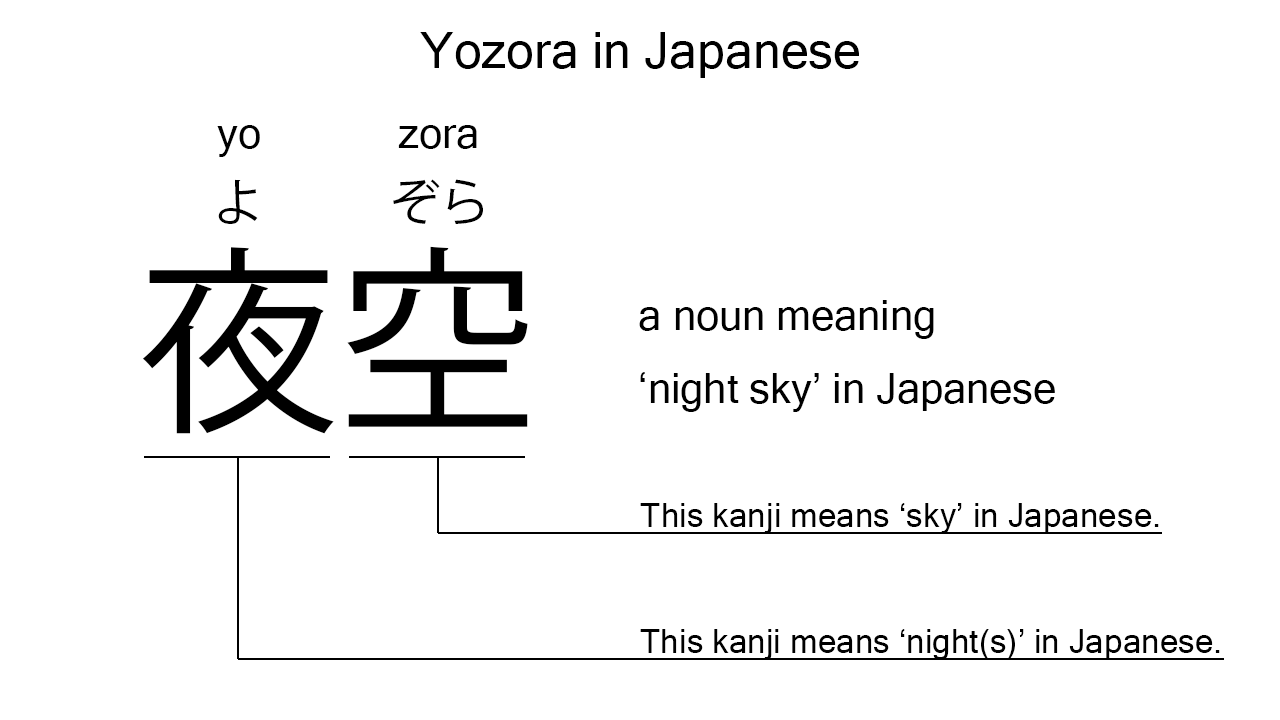What does “yozora” mean in Japanese?
Native speakers say “yozora” to mean ‘night sky’ in Japanese. Perhaps, some Japanese learners know this word as it is sometimes used in Japanese movies, songs, novels, manga, anime, and the like. In this blog post, however, I will explain this word in detail based on its kanji expression. And also, I will explain how to use it through example sentences. My explanations would help Japanese learners understand “yozora” more clearly. Then, let’s get started!
Contents
Definition and meaning of “yozora”
Let me start with the definition and meaning of “yozora”.
- yozora – 夜空 (よぞら) : a noun meaning ‘night sky’ in Japanese.
The definition and meaning are simple and clear. To understand this noun more clearly, however, let me explain its kanji characters in detail, one by one.
What does “yozora” literally mean in Japanese?
The kanji expression of “yozora” consists of the following two kanji characters:
- 夜 : a kanji character used to mean ‘night’ in Japanese.
- 空 : a kanji character used to mean ‘sky’ in Japanese.
These two kanji characters tell us that the formed noun literally means ‘night sky’ in Japanese. What the kanji characters express is completely in line with the actual meaning.

When we meet new kanji expressions, we should check their kanji characters in detail to understand their meanings clearly and deeply. In many cases, kanji characters tell us a lot about the meanings of the expressions they form. Actually, here, we could get the better understanding of “yozora” through the detailed kanji check above.
So far, I’ve explained the definition and meaning of “yozora” together with its kanji characters. Then, let me explain how to use it through the example sentences below.
Example #1: how to say “night sky” in Japanese
yozora ni hoshi ga kagayaku – 夜空に星が輝く (よぞらにほしがかがやく)
Stars shine in the night sky.
Below are the new words used in the example sentence.
- ni – に : a case particle used to say where someone does something. In the example, this is used after “yozora” to say where the stars shine.
- hoshi – 星 (ほし) : a noun meaning ‘star’ in Japanese. This can also work as plural. Learn more about Japanese plural.
- ga – が : a case particle used to make the subject word or the object word in a sentence. In the example, this is used after “hoshi” to make the subject in the sentence.
- kagayaku – 輝く (かがやく) : a verb meaning ‘to shine’ in Japanese.
This is a typical usage of “yozora”. In this example, it works together with the case particle, “ni”, to say “in the night sky” in Japanese.
Example #2: another usage of “yozora”
kon’ya wa yozora ga kirei desu ne – 今夜は夜空が綺麗ですね (こんやはよぞらがきれいですね)
The night sky is beautiful tonight, isn’t it?
Below are the new words used in the example sentence.
- kon’ya – 今夜 (こんや) : a noun meaning ‘tonight’ in Japanese.
- wa – は : a binding particle working as a case marker or topic marker. In the example, this works as a topic marker after “kon’ya” to put a focus on it.
- kirei – 綺麗 (きれい) : the stem part of the na-adjective, “kireina“, which means ‘beautiful’ in Japanese.
- desu – です : an auxiliary verb used after a noun or adjective to make it polite. Probably, this is well known as a part of Japanese desu form. In the example, this is used after “kirei” to make it sound polite.
- ne – ね : a sentence-ending particle used to ask for agreement softly. As the definition suggests, this is used at the end of the example sentence to ask for agreement softly. This has been reflected as “isn’t it?” in the English sentence.
This is another typical usage of “yozora”. In this example, it works together with the case particle, “ga”, to become the subject in the sentence. When we want to say “night sky” in Japanese, anyway, this noun is always a very good option.
Summary
In this blog post, I’ve explained the definition and meaning of “yozora” in detail based on its kanji expression. And also, I’ve explained how to use it through the example sentences. Let me summarize them as follows.
- yozora – 夜空 (よぞら) : a noun meaning ‘night sky’ in Japanese. These two kanji characters literally mean ‘night sky’ in Japanese. What the kanji characters express is completely in line with the actual meaning.
Hope my explanations are understandable and helpful for Japanese learners.